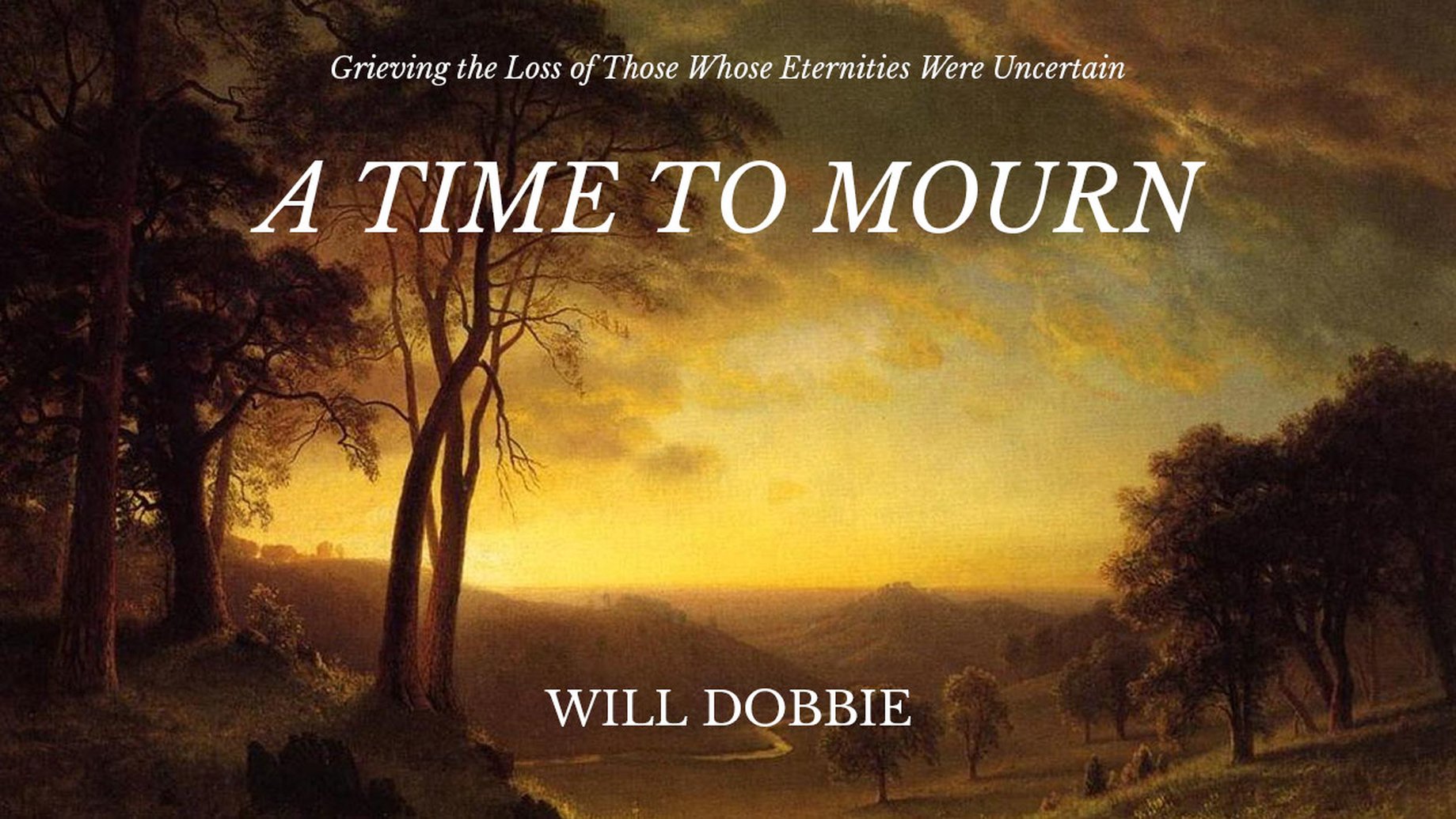
The article below is adapted from the final chapter of book ‘A Time to Mourn: Grieving the Loss of Those Whose Eternities Were Uncertain’ by Will Dobbie (Christian Focus, 2023). It is available through www.amazon.com and www.christianfocus.com.
The death of someone you care about, whom you don’t think was saved, is surely one of the most heartbreaking of circumstances. It can haunt for a lifetime. Yet the eternal loss of unbelievers is something most believers experience several times over. Four times in Scripture, God condemns false prophets for ‘healing the wound of His people lightly’ and ‘saying, “Peace, peace,” when there is no peace.’[1] I don’t want to face that condemnation. So we must look at Scripture honestly as well as sensitively, clearly as well as compassionately. Yet I trust you will discover that more clarity leads to more comfort, not less. In the words of C. S. Lewis, ‘… comfort is the one thing you cannot get by looking for it. If you look for truth, you may find comfort in the end: if you look for comfort you will not get either comfort or truth – only … wishful thinking … and, in the end, despair.’[2] May you experience truth and perhaps unexpected comfort and solace in the principles below.
In the words of C. S. Lewis, ‘… comfort is the one thing you cannot get by looking for it. If you look for truth, you may find comfort in the end: if you look for comfort you will not get either comfort or truth – only … wishful thinking … and, in the end, despair.’
1. Pursue Truth.
In his novel Cloud Cuckoo Land, Anthony Doerr describes a little girl in medieval times learning to read, and her world expanding exponentially as a result. ‘She practices her letters on the thousand blank pages of her mind. Each sign signifies a sound, and to link sounds is to form words, and to link words is to construct worlds.’[3] Through the tiny, innumerable building blocks of our thoughts, each of us is constantly constructing the worlds we inhabit. Think intentionally and scripturally around the difficult subject of God’s judgement. In your pain, don’t shy away from substantive theology. Make God’s thoughts your thoughts. Build your world carefully. Paul urges, ‘Whatever is true … think about such things.’[4] And you will find, as C. S. Lewis promises, that truth leads to comfort.
2. Draw Near to God
Scripture abounds with expression of the depth and passion of God’s care for you. As much as you might want to withdraw from Him in the aftermath of your loss, now is the time to do the opposite. Through prayer and Scripture and fellowship, lean into Him. Do this as a discipline, whether you feel like it or not. God–willing, your heart will follow. ‘Come to me, all who labour and are heavy laden’, Jesus urges, ‘and I will give you rest. Take my yoke upon you, and learn from me, for I am gentle and lowly in heart, and you will find rest for your souls.’[5] Now is the time to run towards the One who understands your grief more than anyone, the Man of Sorrows Himself,[6] the One who treasures your tears, uses them for good, and will one day wipe them away forever.
3. Grieve Well
A stiff upper lip is more British than biblical, more stoical than Scriptural. Of course it is right to be courageous and resilient and to trust God. But these are not mutually exclusive with healthy, natural, God–honouring grief. We have a God who not only understands our sorrow but shares it. Follow the example of Scripture’s unashamed, articulate, godly grievers – people like Job, and Jeremiah in Lamentations, and David in the Psalms. Use their words to give voice to your own grief.
4. Share God’s Comfort to You with Others
In 2 Corinthians 1, Paul blesses ‘the Father of mercies and God of all comfort, who comforts us in all our affliction so that we may be able to comfort those who are in any affliction with the comfort with which we ourselves are comforted.‘[7] He continues, ‘If we are afflicted, it is for your comfort …’[8] There are many brothers and sisters around you aching with your same ache. Come alongside them with the truths we’ve looked at. Make your grief productive. Let it bear fruit. Don’t waste it.
5. Cultivate Contentment in Your Incomplete Knowledge
God alone has the ability and the right to know a person’s heart at their point of death. Know that there will be surprises in heaven. Trust your Father’s wisdom in giving you as much or as little indication of another’s eternity as He has deemed best for you. Don’t seek to peer beyond the evidence He has chosen to put before you. Don’t look for signs in dreams or other cryptic indications. You will likely end up experiencing wish–fulfilment, as well as weakening your faith in the sufficiency of God’s Word. Accept that ‘For now, we see in a mirror dimly.’[9]
6. Learn to Leave People with the Lord
Consciously work and pray at entrusting people to your Heavenly Father. He is good and wise and just far beyond our current understanding. You can trust Him with your loved one’s future. The more you are able to leave people with the Lord, the more you will find relief and peace. Let God be God.
7. Be Serious about Your Own Salvation
In Luke 13, Jesus cites tragedies in which Galileans were murdered by Romans and others died in a natural disaster when the tower of Siloam collapsed. His sobering point to his listeners is that ‘unless you repent, you will all likewise perish.’[10] We have a God who in His holiness and righteousness will judge. He intends this loss of others to drive us to confirm that we really have escaped the wrath to come. Paul reminds the Corinthians ‘of the gospel … by which you are being saved, if you hold fast to the word I preached to you – unless you believed in vain.’[11] He’s challenging them to check that they really are holding onto the word of life, that they really are believing. Paul warns the Philippians to ‘work out your own salvation with fear and trembling’[12] – that is, to pursue it urgently rather than presume on it complacently.
It is possible to be unhealthily introspective, at the cost of God–honouring assurance. But it is also possible to be casual and complacent and presumptuous. God uses the loss of others to warn us away from this. Pause right now. Visualise standing before God in a few hours’ time. (You just might be. In Puritan Arthur Dent’s words, ‘We should always live as if we should die, or that our bed should be our grave; [we] must live continually as if Christ should come to judgment presently.’[13]) As you read these words, are you really repenting of your sin? Are you really trusting in Christ’s death alone as the grounds for God to accept you? ‘We are but a heartbeat from eternity, which hangs upon the thin thread of time … Our lives are not just a journey to death; we are journeying to heaven, that eternal day that knows no sunset, or to hell, the eternal night which knows no sunrise.’[14] Journey carefully. Journey deliberately.
8. Put Sin to Death
Part of being serious over our salvation is being ruthless over our sin. In Matthew’s Gospel, Jesus teaches, ‘If your right eye causes you to sin, tear it out and throw it away. For it is better that you lose one of your members than that your whole body be thrown into hell. And if your right hand causes you to sin, cut it off and throw it away. For it is better that you lose one of your members than that your whole body go into hell.‘[15] Christ unashamedly uses the horror of hell to drive home the seriousness of sin, for hell is where sin leads in the end. We are saved not by our fight against sin, but by faith. Yet if our faith is real, it will manifest itself in a desperate fight against sin. What do you need to repent of right now? What practical steps do you need to take, no matter how extreme, to ‘tear out’ and ‘cut off’ sin from your life?
9. Be Humbled by Your Own Salvation
Someone who fears for the salvation of loved ones emailed me with the following words: ‘The death of unbelieving loved ones is an occasion for believers to express earnest worship and profound gratitude to God … They should bow their heads with humility, knowing it is only by God’s electing grace that they themselves know him as savior.’ None of us have any right to salvation. The arresting truth isn’t that some aren’t saved – it’s that any are. The tragedy of the loss of others throws into relief the miracle of our own escape. We should be gasping, ‘There but for the grace of God go I.’ The psalmist knew this: ‘I give thanks to you, O Lord my God, with my whole heart, and I will glorify your name forever. For great is your steadfast love toward me; you have delivered my soul from the depths of Sheol.’[16]
10. Be Urgent in Evangelism
A friend of mine once told me of a dream he’d had, of watching an endless line of people shuffling through a doorway into flames beyond. One of them suddenly turned to face him. He realised with a shock that this was his own non–Christian roommate. The roommate said, ‘Why didn’t you tell me about this?’ Then he woke with a start. Allow your loss to fuel your evangelism, and may God use that to prevent the loss of others. Take up the judgement–tinged urgency at the end of Psalm 2, ‘Kiss the Son, lest He be angry, and you perish in the way, for His wrath is quickly kindled. Blessed are all who take refuge in Him.’[17]
11. Don’t Bear Responsibility for the Lost which isn’t Ultimately Yours
In the final analysis, lost people never end up in hell because of our failure to witness to them or pray for them. They end up in hell because of their willful determination to reject God, and because of His mysterious sovereign choice. Don’t assume a burden of responsibility which isn’t ultimately yours, and which you will not be able to bear. Repent of the inevitable failures to witness and pray which we all have, receive God’s forgiveness and grace, and acknowledge that His perfect will is inexorable. Don’t bear responsibility for the lost which isn’t finally yours.
12. Be Quick to Forgive Unbelievers
‘Beloved, never avenge yourselves, but leave it to the wrath of God, for it is written, “Vengeance is mine, I will repay, says the Lord.”’[18] God’s vengeance on an unbeliever will be far more severe than yours could ever be. Perhaps they have wronged you horrifically. Consider hell, then see if you are still able to aim bitter resentment at them. Your tears will shortly be wiped away, and unless something changes, they will shortly enter terrible suffering forever. Extend forgiveness to them. You will be obeying God, doing good to yourself, and witnessing to them. Allow the truth of judgement to bear the fruit of compassion and forgiveness in your life.
13. Be Receptive to Refinement
Scripture is adamant that God uses our tragedies for our refinement. Be open to God lovingly, painfully doing that work in your life with the tragedy of your loss. We can be quick to jump on the promise of Romans 8:28, that God works all things together for good for His people. But we are not always as quick to define what ‘good’ is – which the very next verse does: it is ‘to be conformed to the image of His Son.’[19] Consider the goldsmith who purifies gold by turning up the heat. As the gold melts, impurities float to the surface and are skimmed off. How does he know when he has completed the process? When he can see his own reflection in the precious metal. Know that God is using the awfulness of your loss to make you more like Christ. Ponder how He might be doing this so that you can be leaning into that process.
14. Keep the Eternal Perspective
In the graveyard of a church in Dundee lies an ancient, weathered stone, blank except for one word engraved in large letters: ‘Eternity’. One of the church’s pastors (perhaps the great Robert Murray M’Cheyne in the 1800s) had wanted people to consider the coming ‘forever’ on their way in and out of church.[20] The reality of eternity changes everything. The next world is when we will finally perceive God’s judgement with perfected hearts and minds, finally see the true horror of sin, finally value His glory as it deserves, finally have every tear wiped away, finally be able to rejoice and be at peace. As Paul promises the Corinthians, ‘Now we know in part; then we shall know fully.’[21]
15. Keep Your Loves Well–Ordered
Augustine of Hippo helpfully explained sin in terms of wrongly–ordered loves. He showed that we are prone to loving less important things more, and more important things less. The first of the Ten Commandments, for example, is effectively to have no other loves before our love for God.[22] Jesus likewise taught that the most important commandment is to love God, and the second is to love my neighbour.[23] When I reverse the order of these, I place a greater weight of love and worship on lesser objects than is appropriate, and a lesser weight of love and worship on the greater object than He deserves.
Cultivate a love for God and His glory which outshines your love for anyone else. Resist idolising any other person over Him. This, ironically, is what will enable you to love any other person better. The best thing I can do for my wife and children is to love God more than them – that’s what will enable me to be a better husband and father. The best thing I can do for my unsaved loved ones is to love God more than them – that’s what will enable me to be a better, kinder person around them and a better witness to them. On top of this, keeping God first will enable you to survive the eternal loss of any other person. Otherwise, if they are first, and perish, it will be your god who has perished, leaving you to unravel.
16. Treasure Christ
On the cross, Jesus bore the righteous wrath of God for the sin of His people. He was enduring hell itself. In fact, He was experiencing the equivalent of all the eternities in hell that all of His millions of people would have faced. This depth of suffering is unfathomable. Yet it is what Jesus went through for you! This is how much He loves you! And in His ability to be that sinless substitute for you, here is His perfect purity, precious and beautiful beyond description. In the hell of the cross, here is His courage, His selflessness, His faithfulness. The magnificence of Christ blazes out of the darkness of the doctrine of hell. He is a Christ whose value and splendour will light up your life, regardless of your circumstances. Treasure Him.
In the End
In the end, my one final word of encouragement and hope is simply this: ‘Let us fix our eyes on Jesus, the author and perfecter of our faith …’[24] Jesus Christ exemplified perfectly for us the applications above. When we fail at them, as we will, it is Jesus Christ whose blood has paid for those failures, and whose grace enables us to pick ourselves up, dust ourselves down, and try again. And it is Jesus Christ Himself who is at the heart of each one:
It is Jesus Christ Himself who is at the heart of each application above. He is the truth; the One to whom we draw near in our loss.
He is the truth; the One to whom we draw near in our loss; the One to whom we take our grief; the One to whom we point those we’re comforting; the One in whom we rest with our incomplete knowledge of the fates of others; the One on whom we focus when checking our own salvation; the One whose urgent warnings we heed when we put sin to death; the One before whom we bow in relief and humble thanks as we consider our own miraculous escape from the wrath to come; the One to whom we point others as we witness; the One who has atoned for our failures to witness and who cleanses our consciences by the cross; the One whose example teaches us to forgive others; the One who will be at the centre of the coming eternity when everything becomes clear; the One of infinite value, whose glory now and forever is worthy of our highest love and commitment.
Fix your eyes on Him.
[1] Jer. 6:14 – see also Jer. 8:11 and Ezek. 13:10, 16
[2] C. S. Lewis, Mere Christianity (HarperCollins, 2001), 32.
[3] Anthony Doerr, Cloud Cuckoo Land (Scribner, 2021), 45.
[4] Phil. 4:8
[5] Matt. 11:28, 29
[6] Isa. 53:3
[7] 2 Cor. 1:3, 4.
[8] 2 Cor. 1:6
[9] 1 Cor. 13:12
[10] Luke 13:3, 5
[11] 1 Cor 15:1, 2
[12] Phil. 2:12
[13] Arthur Dent, The Plain Man’s Pathway to Heaven; Wherein Every Man May Clearly See Whether He Shall Be Saved or Damned (1599; repr., Soli Deo Gloria, 1994), 1.
[14] Joel R. Beeke and Mark Jones, A Puritan Theology: Doctrine for Life (Reformation Heritage Books, 2012), 856.
[15] Matt. 5:29, 30
[16] Ps. 86:12, 13
[17] Ps. 2:12
[18] Rom. 12:19
[19] Rom. 8:29
[20] Joel R. Beeke and Mark Jones, A Puritan Theology: Doctrine for Life (Reformation Heritage Books, 2012), 857.
[21] 1 Cor. 13:12
[22] Exod. 20:3
[23] Matt. 22:36–40
[24] Heb. 12:2 (NIV)




